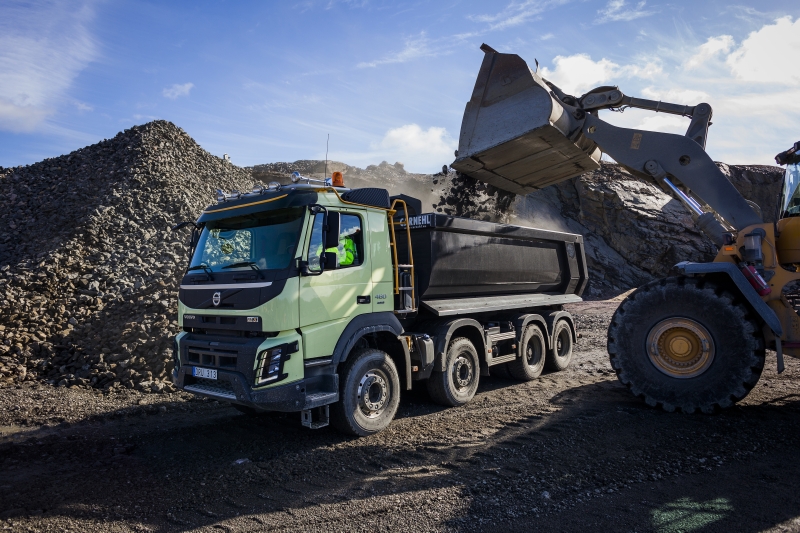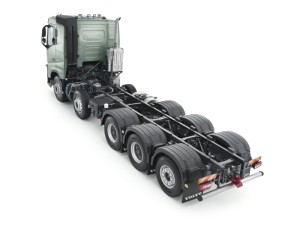Releases five new features for rough terrain
Volvo Trucks continues to improve productivity within construction by releasing another five new features, including Volvo Dynamic Steering for dual front axles and increased front axle loads. This further highlights Volvo Trucks’ special attention to the construction segment.
The first Volvo FMX from 2010 was followed up with a completely updated version in 2013, including innovative breakthroughs such as Volvo Dynamic Steering. In 2015 Volvo Trucks introduces a new series of solutions that enable trucks and drivers operating in tough conditions to perform their work more smartly and efficiently. “Volvo trucks have a solid reputation for its quality and drivelines. By adding new, innovative features we give our customers access to a broader range of options and unique ways to improve productivity,” says Mr. Ricard Fritz, Vice President, Volvo Trucks Brand.
In addition to introducing a heavy duty bumper for the Volvo FH series and the industry first automatic traction control function for the Volvo FMX, five more features are now available:
Volvo Dynamic Steering for dual front axles: Volvo Dynamic Steering is now also available on trucks with dual front axles, a very common configuration in construction operations. Since such trucks often carry particularly heavy loads or superstructures, the benefits are very noticeable for the driver. In addition to far lower turning resistance at low speeds, the steering wheel returns automatically to the straight-ahead position after full lock, cutting out the need for added effort in close-quarter manoeuvring and saving the driver both time and energy. Volvo Dynamic Steering, which was launched in 2013 and was showcased in for example the YouTube hit “The Hamster Stunt”, consists of an electric motor that compensates for vibration and steering wheel movement while minimising the amount of force needed to steer the truck.
Increased front axle loads, dual front axles: Volvo’s heavy duty trucks with dual front axles increase the maximum technical capacity from 18 to 20 tonnes. Customers benefit from both improved productivity and added flexibility. The extra load capacity translates directly into increased income-earning potential, something that is particularly valuable when transporting heavy materials in construction operations. On a 4-axle truck with a gross weight of 32 tonnes the load bed is also longer and there is greater flexibility regarding where to place a load such as gravel in a tipper body. This means maximum load is reached more quickly when loading and that the driver can be certain about meeting weight limitations. Higher load capacity above the front axles also permits a greater variety of crane configurations and allows other applications with considerable weight on the front axles.
Five-axle trucks, 10×4 and 10×6: On many markets, the trend is towards increased gross combination weights of between 50 and 76 tonnes. In order to meet the demand for heavier applications both on highways and in construction, Volvo Trucks is now launching factory-built 5-axle combinations. The two front axles permit up to 20 tonnes maximum load and the three rear axles can handle up to 36 tonnes, resulting in both increased payload and greater flexibility for customers. This solution is also suitable for concrete pumps and large crane trucks that need uniform axle load distribution. By reducing pressure on the axles, many of these vehicles can be transported over longer distances on regular highways, resulting in both faster transportation and increased income potential.
Rear air suspension in combination with driven front axle (Volvo FMX): The new possibility of combining an air-suspended rear axle with a driven front axle permits the highest level of comfort even for trucks with all-wheel drive. Whereas leaf springs are generally dimensioned for the heaviest weights, air suspension offers the flexibility of adjustment to suit the weight of the load. This results in a smoother driving experience and less wear on truck, driver and road surface. Thanks to less vibration, especially when the truck is driven without a load, the driver can maintain a higher average speed on bumpy construction site roads and can thus handle more deliveries during each shift. In addition to the enhanced comfort, Volvo Trucks’ air suspension also offers ground clearance of at least 300 mm and effective protection for all vulnerable components.
Electronic Brake System for drum brakes: Now even customers who specify drum brakes for operation in particularly dusty or wet conditions can benefit from the advantages of Volvo’s Electronic Brake System (EBS). The system’s electronics give access to a range of intelligent functions such as Hill Start Aid for better control on steep gradients. Safety is also improved, thanks to integration of engine braking and retarder function, known as Brake Blending. In addition to improved brake function, EBS in combination with drum brakes also offers access to Volvo Dynamic Steering (not with drive to the front wheels) and more efficient gear changes since I-Shift obtains some of its information from the electronic braking system.
“We want to be the leading brand in the construction segment just as we are in long haul. These new features in combination with our completely updated product range clearly sets a new standard for what a construction truck can deliver,” says Mr. Fritz.
The Volvo Trucks construction offer
In addition to the Volvo FMX, Volvo FH and Volvo FH 16, the Volvo Trucks construction vehicle range also encompasses the Volvo FL with four-wheel drive and gross weight of up to 18 tonnes, and the Volvo FE with maximum gross weight of 26 tonnes. Together with an extensive workshop network and advanced services for excellent availability, customers benefit from considerable flexibility to create individually tailored and safe solutions.


